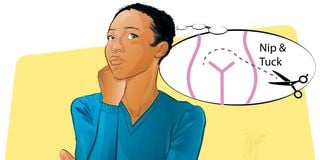When women hate the appearance of their "lady parts" and seek surgery

What you need to know:
- They suffer from a disease called body dysmorphic disorder.
- Further still, some women want the clitoris exposed more.
- Body dysmorphic disorder kills self-confidence and ego
Last Saturday was one fulfilling day at the Sexology Clinic. A lady whom I started attending three years ago came to thank me. She had a two-month-old baby. She had been married for two years.
Let me explain why this encounter was exciting to me. Jennifer reminds me of the women who do not like the appearance of their genitals; those who feel that their organs are ugly. Jennifer came to the Sexology Clinic for that exact reason and requested cosmetic surgery.
“I cannot allow a man to see me naked, and that means that I cannot get into a relationship that may lead to sex.”
Jennifer, an auditor in a reputable firm, was 35 years old then. She was single and with no child. She had had many men approach her for a relationship but she always turned them away.
“I get a reason to put them off. For many, we relate until they start asking for sex. I find a reason to leave them at that point,” Jennifer said.
I interrogated Jennifer to understand if she did have sexual feelings and if the mere fact that she considered her genitals ugly was what kept her from sexual relationships. She confirmed that her sexual desire was fine.
“I hoped that, by now, I would be married and have two children,” she said. “I needed three children by the time I hit 40, but that dream no longer seems valid.”
Just like Jennifer, many people hate their genitals. Most are women. The reasons for this are varied.
So, some want surgery to change the appearance of the genitals. They hate the natural appearance. Many times, they are completely normal, but they will hear nothing of this. They suffer from a disease called body dysmorphic disorder.
Of course, there are women who, other than their appearance, want cosmetic surgery on their genitals to enhance their sexual feelings. They may want the vagina tightened or the G-spot enhanced. Some want their hymen reconstructed so that they appear virgin again.
Further still, some women want the clitoris exposed more.
Culturally, the genitalia of a woman is the seat of many rituals, including female genital mutilation. Harmful cultural practices can distort the genitals as well as cause severe emotional and psychological consequences. Sexual assault also causes injury and disfigurement.
When a woman requests genital cosmetic surgery, therefore, a full assessment is necessary to determine the best course of treatment. I assessed Jennifer fully. The only thing I could put a finger on was body dysmorphic disorder.
As it happens in this condition, Jennifer was preoccupied with the feeling that her genitals were ugly, even though they were perfectly normal.
Body dysmorphic disorder is not treated by surgery. In fact, over 80 percent of women who visit sexology clinics asking for surgery to correct their “flawed” genitals end up getting well after counselling and therapy.
It is important to note that surgery does have complications. That aside, there is no evidence that genital cosmetic surgery improves the well-being of women with body dysmorphic disorder. Not enough evidence has been collected to prove that the surgeries are beneficial.
“So, how do you want to help me?” Jennifer asked impatiently.
She was getting worn out by my monologue.
I put Jennifer in therapy. Body dysmorphic disorder kills self-confidence and ego. With time, it becomes engraved in the mind and influences the way one looks at the world. It then influences social behaviours such as, in the case of Jennifer, avoiding situations that may lead to sex. Therapy reverses this trend of events.
After several sessions, Jennifer disappeared from the clinic.
Then, last Saturday, she reappeared, a bouncing baby boy in her hands and with a proclamation that she had been married for two years.
“I conquered the body dysmorphic disorder, got married, and you can see the fruits,” she said as she lovingly kissed her baby.
As they say, science never lies. Therapy works for body dysmorphic disorder.
Prof Osur is a sexual and reproductive health expert





